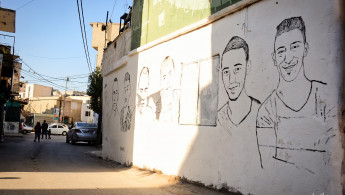Palestinians killed since the beginning of 2023 three times as same period last year
The number of Palestinians killed by Israeli forces since the beginning of 2023 has reached 151, said the Palestinian health ministry in a press release on Monday.
According to the ministry, 33 of the Palestinians killed in the current year were killed by the latest Israeli offensive on the Gaza Strip, which ended with a cease-fire on Sunday. The figure is three times the number of Palestinians killed by Israeli forces during the same period last year.
The year 2022 witnessed the killing of 230 Palestinians, 52 of them were killed between January and mid-May, including the Palestinian journalist Shireen Abu Akleh. The UN said that 2022 was the deadliest for Palestinians since 2005.
Israeli forces had already killed 128 Palestinians by early May of this year before the beginning of the Israeli bombings on the Gaza Strip, Most of them in the West Bank.
"With the killing of the youth in Askar, the number of Palestinians who were killed by Israeli gunfire has risen to 152, including 33 who were killed during the most recent Israeli aggression on the Gaza Strip."
— Palestine Deep Dive (@PDeepdive) May 16, 2023
Article from @PalestineChron https://t.co/m59ZO7IEVX pic.twitter.com/es77GGk6Qm
On Monday, Israeli forces killed 22-year-old Saleh Sabra, who was from the Asker refugee camp in Nablus, during a military raid. Sabra's killing came days after that of 30-year-old Aws Hamamdeh, who died of wounds sustained during an Israeli raid on Qabatiya, near Jenin.
"Aws was married and father of three daughters, and he worked at a supermarket," Mohammad Habash, a relative of Aws, told The New Arab.
"When the occupation forces entered Qabatiya and surrounded a house, Aws hurried like many residents to help the young men entrenched inside the house by throwing stones at the occupation soldiers, and that's when he was shot," detailed Habash.
"He was too young, just like the other two young men who were killed with him," said Habash. "This is the occupation, there's nothing we can do about it."
"Gaza is home to 2.2 million Palestinians, half of whom a children. At least six Palestinian children have been killed in Gaza in the latest aggression."
— Palestine Deep Dive (@PDeepdive) May 16, 2023
Article by Mariam Mohammed Al-Khateeb in @PDeepdive https://t.co/IcSSrUNJQM
In Gaza, Israeli bombings began last week, after Palestinian factions fired rockets on Israel in response to the death of the Palestinian leader Khader Adnan in an Israeli prison after an 86-day hunger strike in protest of his arbitrary detention.
Israel launched attacks by targeting three Palestinian leaders from the Palestinian Islamic Jihad Movement, with their families, while they slept.
"We woke up to the shaking of our house to its core as the occupation aeroplanes bombed the house of Khalil Bahtini who used to live with his family just down the street," Hadeel Gharbawi, a resident of Gaza, told TNA.
"Later, neighbours pulled the bodies of Khalil, his wife, and his 5-year-old daughter Hajar from the rubble," said Gharbawi. "They were taken first to the house of Khalils’ mother, in the same street, where all the neighbourhood gathered, and as soon as the bodies came in there was an eruption of weeping by men as well as by women."
"Each time there is an attack on Gaza we tell ourselves we are accustomed now, that we know how to handle it, but every time there is as much terror and fear as if it was the first time," said Gharbawi.
"Everybody fears the loss of a loved one because there is no safe place to go to in Gaza, and the occupation doesn't make any difference between civilians or fighters. I don't know how, if ever, life will return to normal in Gaza," she added.
The 5-day lsraeli aggression on Gaza has left 33 Palestinians killed, 190 others injured, and 1050 housing units completely or partially destroyed. pic.twitter.com/JFA10tIX04
— TIMES OF GAZA (@Timesofgaza) May 14, 2023
On Friday, the UN special rapporteur on human rights in Palestine, Francesca Albanese, described Israeli actions in Palestinian territories as "colonial", stressing that "escalation of violence from Israel's part in Palestine-occupied territories are not accidental but cyclical and can only be fixed by making sure that Israel recognises international law".
On Monday, Palestinian President Mahmoud Abbas demanded international protection for the Palestinian people during a speech at the first-ever UN commemoration of the Palestinian Nakba. Abbas also called upon the UN to suspend Israel's membership in the international body, until it implements international resolutions concerning Palestinian rights.




 Follow the Middle East's top stories in English at The New Arab on Google News
Follow the Middle East's top stories in English at The New Arab on Google News


